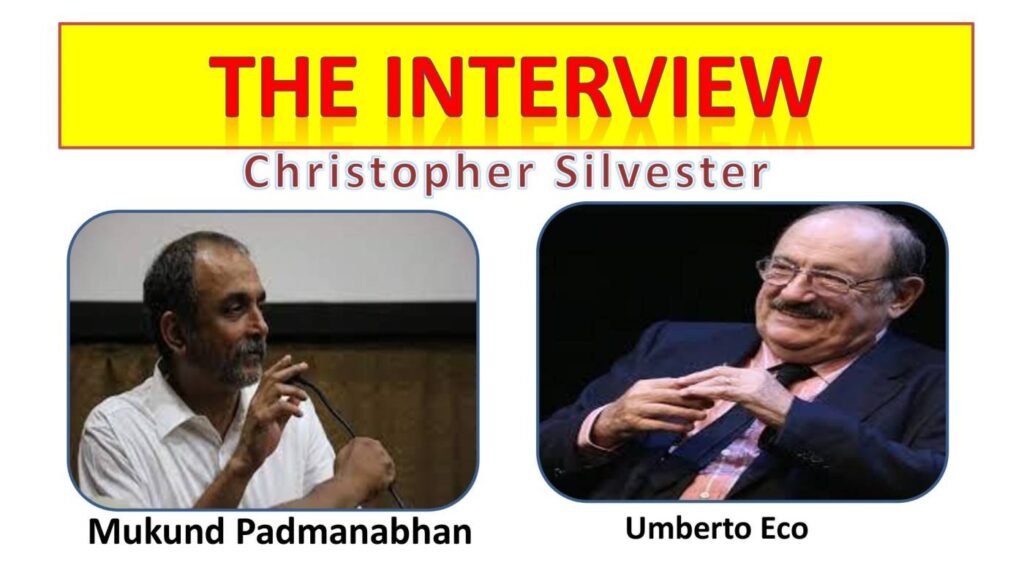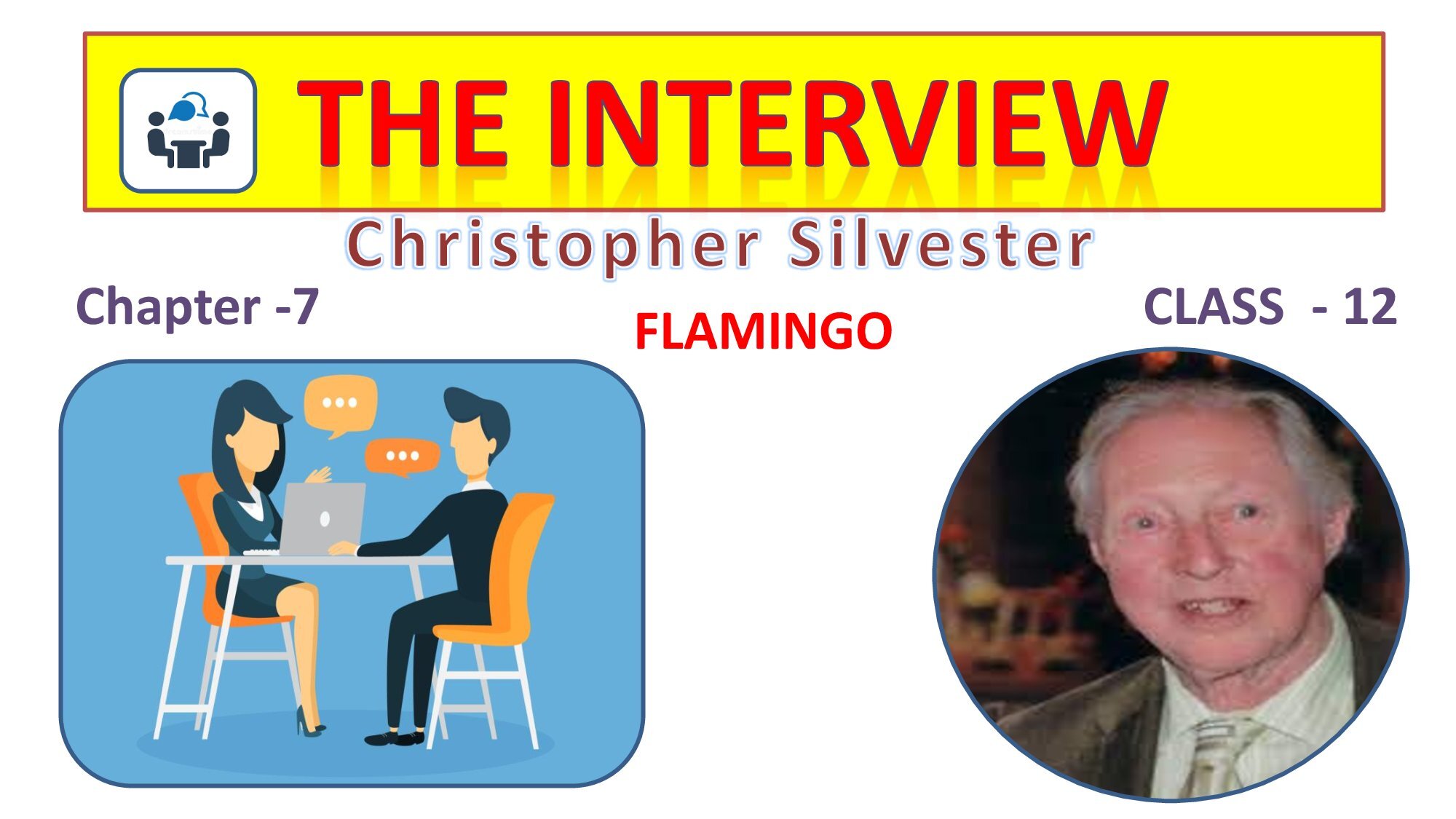The Interview is chapter -7 in Class 12 Flamingo book. What is interview ? Explanation of interview, the interview summary of interview chapter and questions answers of interview are given here detailed study.
The Interview – Introduction
The Complete chapter is divided into following parts-

Part -1
The interview Part I is an extract taken from CHRISTOPHER Silvester’s Penguin Book of Interview. It deals with positive and negative impacts of interview on interviewers and interviewee. It also describes the different opinions of the critics on it.
The Interview Summary Part 1
Interview has become a common feature of journalism since it was invented before 130 years. Most of literate people will have read an interview during their lives because many of famous men or celebrities have been interviewed over the years. Critics have different opinions about interview, its functions, methods and merits.
Some people consider that interview is the source of truth in its form, but in its practice, it is an art. Some others hate to be interviewed because they consider it as ‘an unwarranted intrusion ‘in their lives. They feel that interview diminishes them just as it takes photographic portrait of a person by stealing his soul.
V. S. Naipaul feels that some people are wounded by interviews and they are forced to lose a part of their personalities.
Lewis Carroll who wrote Alice in Wonderland considers that it is horror of the interviewer. it gives a lot of public attention to them because it made them push back from their future acquaintances, interviewers and the petitioners for autograph and they try to relate their stories of his success. So, He never permitted anybody to take his interview.
Rudyard Kipling also expressed his opinion on interview which denotes his more contemporary attitude towards the interviewer. his wife , Caroline said why she was not ready to be interviewed because interview is immoral. it is a crime just as an offence against a person. It is an attack on one just as merits punishment. it is cowardly and evil. No respectable person permits to be interviewed.
H. G. Wells expressed his view on interview in 1894 and said that it is a suffering / hardship / bad experience to be interviewed.
Saul Bellow once describes that interviews are like thumbprints on his windpipe.
In spite of so many drawbacks, interview is a supremely serviceable medium of communication. These days, we get very vivid impressions of our contemporary famous personalities only through interviews.
Denis Brian says that every news of current time comes us when one man is being asked question by another. The interviewer holds a position of power and influence that never happened before.
Part -2
The interview Part II is an extract taken from an interview of Umberto Eco. The interviewer is Mukund Padmanabhan from ‘The Hindu’ . The interviewer highlights how Umberto Eco considers that he is an academician first and a novelist later on. He considers himself a university professor who writes novels on Sundays- occasionally.
The Interview Summary Part 2–

Mukund asks Umberto that David Lodge once remarked on him how he can do so many things in his life.
Umberto politely replies that it may be possible that I gives the impression of doing many things , but I am always doing the same thing.
Mukund asks which is that thing.
Umberto Eco says that it is more difficult to explain it . He has philosophical interests. he pursue his philosophical interest through his academic works and novels. His books of children reflect his philosophical interests like non-violence and peace..
He has a secret about life . First he asks a question what will happen when you remove/eliminate entire empty spaces from universe. He himself answers that the whole universe will became as big as his fist. In the same way. We have a lot of empty spaces in our lives. He calls them interstices i.e. intervals which he utilises interstices for writing his work . He claims that he has written an article in the interval while he was waiting for him to come up to me.
Mukund wants to know that his non-fictional writing, your scholarly work has a certain playful and personal quality about it. It is a marked departure from a regular academic style which is depersonalised and often dry and boring. Have you adopted an informal approach or is it something that just naturally come to him?
Emberto Eco says that when he submitted his first doctoral Research theses in Italy to his professors. One of them said that scholars learn very much about a particular subject during the research. Then, they make a lot of false hypothesis, and then they correct them and finally they come to the conclusion. But he have written his research theses in the form of story by following the narrative writing style, including his trials and errors. At that moment, scholars accepted that his theses is right and get it published.
At the age of 22, he becomes able to understand what is actual way in which the research books should be written. That is why his essays always have narrative style and then he started writing novels at the age 50.
He remembers that his friend , Ronald Barthes was always frustrated because he was an essayist, not a novelist. Actually he wanted to write a novel, but unfortunately died.
He says that he has never felt that type of frustration in writing non-fictional work. One day , by chance ,he started writing novels and writing novels suits and satisfied his taste for narration.
Mukund wants to know that he got his actual popularity only after the publication of his famous novel The Name of the Rose. As he has written 20 non- fictional works before writing 5 novels.
Umberto Eco confirms that he has written over 40 non-fictional works.
Mukund asks that in spite of 40 non-fictional work , he has written a work on Semiotics ( the study of science ). And he is famous as a novelist. Does it bother him ?
Umberto Eco replies in affirmation because he considers himself a university professor who writes novels on Sundays. He always participate in academic confirmations, not the meanings of Pen Clubs and Writers. He identifies himself with academic community, not with writer community.
Most of people have read only his novels. He knows that by writing novel, possibly he is able to reach to more audience. He can’t get more popularity by writing on semiotics.
Mukund tells Eco that The Name of the Rose is a very serious novel and it gives more information about metaphysics, theology and medieval past. Despite all these, it got a huge success . Was he puzzled by this ?
Emberto Eco answers that he was not puzzled by this. Specially Journalists and publishers are puzzled because they believe that people like reading rubbish, they do not like difficult reading. Six billion people live on this earth and The Name of the Rose was purchased only by about 15 million copies. So, he only reached a small percentage of readers.
Mukund asks Eco if the reason of the novel The Name of the Rose is that it deals with a period of medieval history.
Umberto Eco says that it is possible but one thing I want to tell you another story, because he writes stories like a Chinese wise man. Perhaps his novel The Name of the Rose got huge success due to its medieval historical background.
He reminds that many have written about the medieval past far before him. But they were not huge successes. Why ‘The Name of the Rose turned out to be such a huge success is a mystery. His American publisher did not hope to sell more than 3000 copies. But two to three million copies were sold in the U.S. alone. Perhaps he wrote the novel at the right time. Had he written it ten years before or after, perhaps it would not have been such a success.
Questions Answers-
Short Question Answers:
Q.1 What are the primitive views of interviews? How is this view corroborated by some of writers of note?
A.1 In some primitive cultures it was believed that if one took a photograph of someone, he was robbing of from his soul. Writers like .S Naipaul believed that people are wounded by interview and lose a part of themselves.
Q.2 What does the writer consider to be the irrefutable merits of the interviews?
A.2 The most irrefutable merit is that it is the most serviceable medium of communication and source of information that one has of one’s contemporaries.
Q.3 What were Umberto Eco’s achievements?
A.3 He was a professor at the University of Bologna, Italy. He acquired reputation as an authority on the study of science of Semiotics, the literary interpretation and medieval aesthetics. He had also written a staggering amount of fiction of all kinds.
Q.4 Why did he regard himself to be first an academician and then a novelist?
A.4 According to him he started writing novels onlyu accidently. He identified more with the academic community and participated in academic conferences and wrote novels only on Sundays.
Q.5 What was unique about his style of writing? How did he support it?
A.5 Hiss writing has a certain playful qualities about it which is a departure from he regular academic style. He felt that scholarly books should be written in a way that tells a story.
Q.6 What did he mean by “empty spaces’? how did he make use of them?
A.6 By ‘empty spaces’ or’ interstices,’ as he called them, he meant all the spare time one has between planned activities. These empty spaces can be prohitably utilized as he always did.
Q.7 Who was Roland Barthes? In which context does Umberto Eco mention him?
A.7 Roland Barthes was a dear friend of Umberto Eco. He remained an essayist and was frustrated by this fact. Unfortunately, he died before he could indulge his desire to write a novel and do some creative writing which had been postponing for a while.
Q.8 How did Eco explain the huge success of his novel “ The Name Of The Rose”?
A.8 He felt that hiss book gained popularity because there were many people who were not nearly looking for easy reading experience. Therefore his book which was a detective yarn only on the surface and delved with medieval history, metaphysics and theology drew a huge leadership.
Q.9 What were the distinguished features of that particular novel?
A.10 It was a detective novel on the surface and actually included forays into medieval history, metaphysics and theology. Despite this it drew a large leadership.
Long Question Answers-
Q.1 An interview is an spot tool for eliciting information from the interviews through a process of questions and answers. Discuss with reference to the interview of Unberto Eco by Mukund Padnabhan.
OR
The writer says that it is hardly surprising that opinions of the interview vary considerably. Elaborabate with reference to “The Interview.”
OR
Mention how celebrities regard Interviews.
Answer – Since its invention about 130 years ago, the commonplace of the interview has under gone considerable changes. Opinions vary o its function, methods and merits. To some in its highest form, it is a source of truth and in its practice and art. Some celebrities regarded interview as an unwarranted intrusion in their lives and feel that in some way it diminishes them. V.S. Naipaul believed that some people are wounded by interviews and lose an part of themselves. Louis Carol expressed a horror of interviews while Rudyard Kipling regarded it as an assault on one’s person.
The irony however is that Rudyard Kipling himself made such an assaulton Mark twain and H.G.Wells who considered interviews as an ordeal found himself interviewing Joseph Stalin. Saul Bellow felt that to be interviewed was like being strangulated. Despite diverse views on interviews the writer feels thtat it is a wonderful medium of getting information and one of the most reliable means of getting a vivid insight into the lives of our contemporaries.
Q.2 What was distinctive about Eco’s writing style?
OR
What was Eco’s opinion of himself as a writer?
OR
What kind of writer is Umberto Eco and what sort of writing does have to his credit?
Answer– Umberto Eco was a qualified writer with a vast variety of writing to his credit. He viewed himself as an academician rather than a novelist. Novel writing was an indulgence of his spare time and he spent more time on his academic writings have a certain playful and personal quality which is a departure from the boring syyle adopted by others.
He says that he has perfected the art of working in empty spaces or interstices. He regarded himself as a University professor who wrote novels on Sundays. He became famous for his novel “ The Name Of The Rose.” It was a detective novel on the surface though it delved into the realms of metaphysics, medieval history and theology. Contrary to expectation it met with huge success. It was because of the fact that the readers who appreciated the novel were those who were not looking for easy experience.
1. What is interview ?
Interview is a medium of communication in conversational form. It is source of truth in its highest form and it is an art in its practise .
2.What is negative impact of Interview ?
Interview is an unwarranted intrusion,forces to lose a part of personalities,horror of the interviewer, immoral, a crime just as an offence against a person. It is an attack on one just as merits punishment.
3. What is positive impact of Interview ?
Interview is is the most serviceable medium of communication and source of information. It brings popularity and is a source to meet a celebrity.
4. What is empty spaces’ or’ interstices ?
Empty spaces’ or’ interstices means all the spare time one has between planned activities.
5.What are the primitive views of interviews?
In some primitive cultures it was believed that if one took a photograph of someone, he was robbing of from his soul.
6.What is Umberto Eco’s writing style?
Umberto Eco’s writing style has a certain playful qualities about it which is a departure from he regular academic style. He felt that scholarly books should be written in a way that tells a story.
Read More…..
